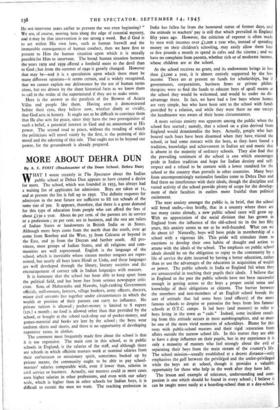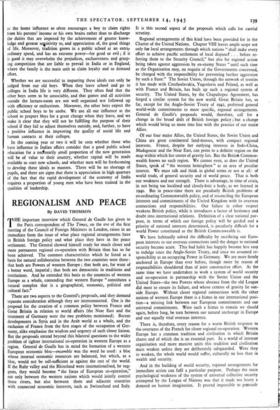MORE ABOUT DEHRA DUN
By A. E. FOOT (Headmaster of the Doon School, Dehra Dun)
WHAT I wrote recently in The Spectator about the Indian public school at Dehra Dun appears to have created a desire for more. The school, which was founded in 1935, has always had a waiting list of applicants for admission. Boys are taken at ii, and at present the list is full up to 1950. The definite requests for admission in the near future are sufficient to fill ten schools of the same size of 300. It appears, therefore, that there is a great demand for this type of education from people who can afford the fees of about £130 a year. About 60 per cent. of the parents are in service or a profession ; zo per cent. are in business, and the rest are rulers of Indian States or landowners in British India or in States. Although more boys come from the north than the south, over 40 come from Bombay and the West, 35 from Calcutta or beyond in the East, and 30 from the Deccan and further south. All pro- vinces, most groups of Indian States, and all religions and com- munities are well represented. English is the language of the school, which is inevitable where sixteen mother tongues are repre- sented, but nearly all boys learn Hindi or Urdu, and these languages are well developed through the library, literary societies and the encouragement of correct talk in Indian languages with masters.
It is fortunate that the school has been able to keep apart from the political field, and has been free from serious newspaper criti- cism. Sons of Maharajahs and Nawabs, high-ranking Government officials, mill-owners, lawyers, village bankers, army officers, doctors, minor civil servant; live together under circumstances in which the wealth or position of their parents can carry no influence. No private tuition is allowed ; pocket-money is limited to 8 rupees (12s.) a month ; no food is allowed other than that provided by the school, or bought at the t.chool tuck-shop out of pocket-money, and games-material and books are lent by the school ; the boys wear uniform shirts and shorts, and there is no opportunity of developing expensive tastes in clothes.
The comment most frequently made first about the school is that it is too expensive. The main cost in this school, as in public schools in England, is the salaries of the staff, and although there are schools in which efficient masters work at nominal salaries from their enthusiasm or missionary spirit, sometimes backed up by private means, the community ought to be able to pay school- masters' salaries comparable with, even if lower than, salaries in civil service or business. Actually, our masters could in most cases earn higher salaries in other professions, and even with our salary scale, which is higher than in other schools for Indian boys, it is difficult to recruit the men we want. The teaching profession in
India has fallen far from the honoured status of former days, and the attitude to teachers' pay is still that which prevailed in England fifty years ago. However, the criticism of expense is often made by men with incomes over ki,00t, a year who, instead of spending money on their children's schooling, may easily allow them four or five pounds a month to spend in cafes and the cinema ; and we have no complaint from parents, whether rich or of moderate income, whose children are at the school.
As the school receives no grant, and its endowment brings in less than £2,000 a year, it is almost entirely supported by the fee- income. There are at present no funds for scholarships, but if governments, corporations, business firms or private philan- thropists were to find the funds to educate boys of st;nall means at the school they would be welcomed, and would be under no dis- advantage there. In fact, we have had a few boys whose homes are very simple, but who have been sent to the school with funds provided by a relation, and while they were there no one except the headmaster was aware of their home circumstances.
A more serious anxiety was apparent among the public when the school first started ; namely, that a school on a plan derived from England would denationalise the boys. Actually, people who har- boured such fears have been disarmed when they have, visited the school, or had some contact with the boys, as they have found a tradition, knowledge and achievement in Indian art and music that is absent in the majority of ordinary schools. They also find that the prevailing sentiment of the school is one which encourages pride in Indian tradition and hope for Indian destiny and self- respect and a refusal to be content with a lower standard for thc school or the country than prevails in other countries. Many boys from uncompromisingly nationalist families come to Dehra Dun and find there no interference with their ideals, though the discipline and varied activity of the school provide plenty of scope for the develop- ment of their faculties in outlets more fruitful than political excitement. •
The next anxiety amongst the public is, in brief, that the school will breed snobs,—less briefly, that in a country where there are too many castes already, a new public school caste will grow up. With an appreciation of the social division that has grown in England from the influence of the old-school tie in the last fifty years, this anxiety seems to me to be well-founded. What can we do about it? Naturally, boys will have pride in membership of a school with a vigorous life. This pride will stimulate them to exertions to develop their own habits of thought and action to attune with the ideals of the school. The emphasis on public school ideals should be on the obligation to repay to the community by a life of service the debt incurred by having a better education, rather than to use the advantages of the education in acquisition of wealth or power. The public schools in India or England fail when they are unsuccessful in teaching their pupils their ideals. I believe that in England in the past the public schools have not been successful enough in getting across to the boys a proper social sense and knowledge of their obligations as citizens. The barrier between the members and non-members of an English- school breeds the sort of attitude that led some boys (and officers) of the more famous schools to despise or patronise the boys from less famous schools at O.T.C. camps. It led boys (and masters) to refer te boys living in the town as "cads." Indeed, some incident result- ing from this attitude occurs in most autobiographies, and so must be one of the more vivid memories of schooldays. Blame for this rests with public-school masters and their rigid separation from affairs outside the narrow school life. In this matter they are able to have a deep influence on their pupils, but in my experience it is only a minority of masters who feel strongly about the evil of separating their boys from the main stream of the country's life. The school mission—usually established at a decent distance—only emphasises the gulf between the privileged and the under-privileged while the boys are at school, though it provides a valuable opportunity for those who help in the work after they have left.
The lesson and example of tolerance, understanding and com- passion is one which should be found in every school ; I believe it can be taught more easily at a boarding-school than at a day-school, as the home influence so often encourages a boy to claim rights from his parents' income or his own brains rather than to discharge the duties that are imposed by the achievement of greater know- ledge and greater seasitivity to, and appreciation of, the good things of life. Moreover, tradition grows in a public school at an extra; ordinary speed, and has an extreme power—for good or evil ; if it is good it may overwhelm the prejudices, exclusiveness and grasp- ing competition that are liable to prevail in India or in England, where the family is the main unit to claim loyalty and to demand effort.
Whether we are successful in imparting these ideals can only be judged from our old boys. When they leave school and go to colleges in India life is very different. They often find that the other boys seem to be unsociable, and that games and all activities outside the lecture-room are not well organised nor followed up with efficiency or enthusiasm. Moreover, the other boys expect the public school boys to be snobs. We use all our influence at the school to prepare boys for a great change when they leave, and we make it clear that they will not be fulfilling the purpose of their school if they fail to adjust themselves outside, and, further, to have a positive influence in improving the quality of social life and human contacts at their colleges.
In the coming year or two it will be seen whether those who have influence in Indian affairs consider that a good public school education for a neetssarily small proportion of the new generation will be of value to their country, whether capital will be made available to start new schools, and whether men will be forthcoming to develop these ideals as masters. There will be no shortage of pupils, and there are signs that there is appreciation in high quarters of the fact that the rapid development of the economy of India requires a proportion of young men who have been trained in the qualities of leadership.



























 Previous page
Previous page